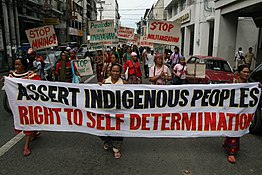Pagdesisyon-sa-sadiri

An karapatan nin sarong tawo na pagdesisyon-sa-sadiri (Ingles: self-determination) sarong panginot na prinsipyo sa presenteng internasyunal na batas (na binibisto bilang jus cogens na panundon), na nag-oobliga sa United Nations bilang awtoritatibong interpretasyon sa mga pamantayan kan Charter.[1][2] Sinasabi kaini na an mga tawo, basado sa paggalang sa prinsipyo nin pantay-pantay na karapatan asin patas na pagkapantay sa oportunidad, igwa nin karapatan na bwelong pilion an saindang soberaniya asin internasyunal na politikal na kamugtakan na mayo nin ulang.[3]
An konsepto inot na ipinahayag kan taon 1860, asin marikas na naglakop pakatapos.[4] [5] Durante asin pakatapos kan Inot na Gera Mundyal, an prinsipyo pigparigon kan Sobyet na Premier na si Vladimir Lenin asin Presidente kan US na si Woodrow Wilson.[4][5] Matapos na ianunsyar an saiyang Katorseng Punto kan 8 Enero 1918, kan 11 Pebrero 1918 si Wilson nagsabi: "National aspirations must be respected; people may now be dominated and governed only by their own consent. 'Self determination' is not a mere phrase; it is an imperative principle of action."[6]
Durante kan Ikaduwang Gera Mundyal, an prinsipyo iniba sa Atlantic Charter, na idineklarar kan 14 Agosto 1941, ni Franklin D. Roosevelt, Presidente kan Estados Unidos, asin si Winston Churchill, Prime Minister kan United Kingdom, na pinanugaan an Walong Prinsipal na punto kan Charter.[7] Ini minimidbid bilang internasyunal na legal na karapatan pakatapos na iyan malinaw na nalista bilang karapatan sa UN Charter.[8]
Dai sinasabi kan prinsipyo kun pano gigibuhon an desisyon, ni kun ano an maninigong magin resulta, baga man iyan independensya, pederasyon, proteksyon, sarong klase nin awtonomiya o lubos na asimilasyon.[9] Ni sinasabi man kaiyan kun ano an maninigong magin salang paniniwala nin mga banwaan o kun ano an banwaan. Igwa nin nagkokorontrahan na mga pakahulugan asin legal na basehan para sa pagdeterminar kun arin na mga grupo an pwedeng lehitimong maghingako kan karapatan sa pagdesisyon-sa-sadiri.[10]
Sa pankagabsan, an terminong pagdesisyon-sa-sadiri manunungod man sa libreng pagpili kan sadiring mga hiro na mayo nin panluwas na pamimirit.[11]
Susugan
[baguhon | baguhon an source]- ↑ See: United Nations General Assembly Resolution 1514 in Wikisource states
- ↑ McWhinney, Edward (2007). Self-Determination of Peoples and Plural-Ethnic States in Contemporary International Law: Failed States, Nation-Building and the Alternative, Federal Option. Martinus Nijhoff Publishers. p. 8. ISBN 978-9004158351.
- ↑ See: Chapter I - Purposes and Principles of Charter of the United Nations
- ↑ 4.0 4.1 Jörg Fisch (9 December 2015). A History of the Self-Determination of Peoples: The Domestication of an Illusion. Cambridge University Press. p. 118. ISBN 978-1-107-03796-0.
- ↑ 5.0 5.1 Knudsen, Rita Augestad (October 2013), Moments of Self-determination: The Concept of 'Self- determination' and the Idea of Freedom in 20th- and 21st- Century International Discourse (PDF), The London School of Economics and Political Science
- ↑ "President Wilson's Address to Congress, Analyzing German and Austrian Peace Utterances (Delivered to Congress in Joint Session on February 11, 1918)". gwpda.org. February 11, 1918. Retrieved September 5, 2014.
- ↑ See: Clause 3 of the Atlantic Charter reads: "Third, they respect the right of all people to choose the form of government under which they will live; and they wish to see sovereign rights and self government restored to those who have been forcibly deprived of them" then became one of the eight cardinal principal points of the Charter all people had a right to self-determination.
- ↑ "Self-Determination". Oxford Public International Lawdoi=10.1093/law:epil/9780199231690/e873.
- ↑ "United Nations Trust Territories that have achieved self-determination". Un.org. 1960-12-14. Archived from the original on 2009-10-31. Retrieved 2012-03-04.
- ↑ Betty Miller Unterberger, "Self-Determination", Encyclopedia of American Foreign Policy, 2002.
- ↑ "Merriam-Webster online dictionary". Merriam-webster.com. Retrieved 2012-03-04.
